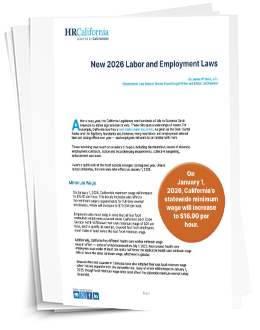California Break Laws and Calculating Travel Time
Counting and Recording Hours of Work: Travel Time, Overtime & More
A variety of California and federal laws govern your counting and recording of employees' working hours and compensation. Under certain circumstances "working hours" may include such activities as travel time and education/training time.
Common Mistake
- Not paying required overtime premiums.
Workdays and Workweeks Defined
Having a clearly defined workday and workweek is important because it affects your overtime obligations to employees.
Best Practices
- Once you define a workday and workweek, stay consistent.
- Familiarize yourself with the "seventh-day" overtime rule.
Hours of Work Limitations
Various federal and state requirements impose limitations on work hours. HRCalifornia can help you determine which to follow when federal and state regulations conflict.
Rest Breaks and Meal Periods
You have certain legal requirements regarding employee meal and rest breaks in California.
Piece Rate Workers
California employers must pay piece rate workers for rest and recovery periods and other non-productive time at specified minimum hourly rates, separate from the piece rate compensation.
Paid Non-working Time Overview in California
There are times when you need to pay a nonexempt employee for time not spent working. If you pay a special rate for travel time, or other special circumstances, you must establish and communicate the rate to employees in advance of the event. The amount and duration depend on what the employee is doing during that time.
Travel Time Pay
Under certain circumstances, you may be required to pay your employees for their travel time.
Pay For Education and Training Time
If you require employees to attend lectures, work courses, employer-sponsored training programs, or employee meetings, you must count that time as hours worked for pay purposes.
Makeup Time Pay
Makeup time allows an employee to request time off for a personal obligation and make up the time without receiving overtime pay. Under certain conditions, you may allow makeup time, upon request from an employee, but you are not obligated to do so.
Compensatory Time Off
Private employers subject to the federal Fair Labor Standards Act (FLSA) are forbidden from offering compensatory time off (CTO) in lieu of paying overtime wages.
Time Keeping and Recording
You must maintain an accurate record of employees' hours of work and compensation. Failure to do so may force you to disprove what an employee claims to have been his/her actual work hours.
Time Keeping Exceptions for Specific Industries
Due to the operational needs of certain industries, the California Labor Code and Industrial Welfare Commission (IWC) Wage Orders allow for specific variations in how hours of work are recorded, how records are maintained, and how certain types of hours are treated for pay purposes.
Working Hours for Minors
California and federal labor laws place certain limitations on the number of hours minors may work, as well as the spread of those hours, depending on the worker's age, the industry and the season of the year. Extended working hours may be allowed under certain circumstances.
Related Resources
CalChamber members have access to several tools and services that help those who manage human resources to work through counting and recording work hours issues, including:
Meal and Rest Break Quiz »
How much do you know about meal and rest breaks? Use this quiz to test your knowledge.
Meal Break Waiver »
Use this form when you have a nonexempt worker who will work a shift of six hours or less and both you and the worker wish to waive the required 30-minute meal break.
Meal Break Waiver - Second Meal »
Use this form when you have a nonexempt worker whose shift will be more than 10 hours but less than 12 hours, the worker has not waived his first meal break, and both you and the worker wish to waive the second required 30-minute meal break.
Alternative Workweek Calendar »
You can use this calendar as an example of an alternative workweek schedule, noting the restrictions associated with alternative workweeks.
Makeup Time Checklist »
If you are considering a makeup time policy for your employees, use this checklist before implementing the policy to make sure you are covering all the key issues.


